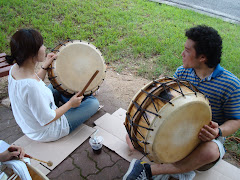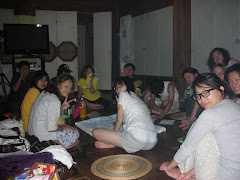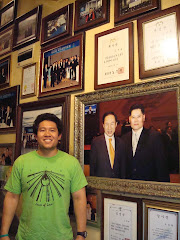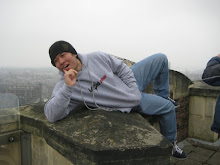Sunday, July 26, 2009
Green Tea Ice Cream
Saturday, July 25, 2009
Andong
Monday, July 13, 2009
Time for a Shave
Friday, July 3, 2009
Real-life Situations
Sunday, June 28, 2009
Mother
Saturday, June 20, 2009
"힘 안줘?!"
Tuesday, June 16, 2009
Turtle Running
So I'm in to my third week here in Korea, and although eight more weeks here seems a bit far off at the moment, I know that it will come fast. Thus, I'm trying my best to maximize the time that I have and learn as much as I can before that time comes. Just staying the course, but sometimes deviating and trying a new path when the opportunity arises.
This past weekend was packed with new sites and exploration. On Saturday, I met up with Uncle Se, a friend from back home who knows the Seoul area very well (he grew up here). We ventured to the COEX Mall where we first toured the Su Jok Kwan (Aquarium). I couldn't even remember the last time I visited an aquarium, and it was a great way to catch up on my aquatic-related Korean vocabulary. After the aquarium, we went to see a movie at the mall theaters. Although there were several American movies playing in English, I thought it would be a better experience to see a Korean movie instead. So we chose 거북이 달린다 (Turtle Running), which was a comedic action thriller about an old and slow detective pursuing a sleek, swift thief. Although I didn't understand most of the dialogue, I could still follow the story line and appreciated the messages behind the movie. If a slow and steady turtle can catch the rabbit, just imagine what a running turtle can do! And who is to tell the turtle that it can't run? Since coming to Korea, I've noticed the incorporation of turtles in other parts of Korean life and culture. At Gyeongbokgung palace for instance, there were several turtle statues serving as animal guardians and protectors of the court. From this traditional setting to the medium of modern Korean cinema, the turtle carves its place into Korean culture. Whether its meaning today is the same as it was during the Choson dynasty, I do not know. Perhaps a turtle's ability to run is a new phenomenon.
On Sunday, I left early in the morning for Olympic Park, the site of the 1988 Seoul Olympics. The park is on the south side of the Han River, and took about fifty minutes by subway to get there. The athletic complexes were still in great condition, and seemed to still be in use. I was able to freely walk in and see the main tennis and gymnastics arenas. While the arena and stands were empty and eerily quiet, the energy and greatness of the place still resonated deeply within the sleeping walls of the arena. It was as if I could still hear the thundering cries of the crowd and feel the athletes' pain and joy in defeat and victory for their country.
The two main themes of the 1988 Olympics were Progress and Harmony, where differences in political ideologies could be left aside where East and West could come together despite cultural differences. It was only the second Olympics to be held in an Asian country, and allowed Korea to both share it's culture with the world and showcase its capability as a modern, global power. It was a collaborative effort on Korea's part to make the it a successful and safe event, as many offered their time as volunteers. In the Olympic Museum close to the entrance of the park, athletes from many different countries as well as their feats are recognized and commemorated. I also didn't realize that the carrying of the Olympic torch to the host country begins in Athens. Thus, the torch was lit in Athens, flown over to Jeju island (Korea's southern island), and carried over a period of 22 days through the Korean peninsula until finally reaching Olympic Park.
While the park still remains to be a historical site, people use it for their daily exercising activities and leisure. This was quite evident in a public event taking place right in front of the Peace Gate or entrance to the park as I was passing by. As you can see in the video that I posted, the people were very enthusiastic about cycling.
After visiting Olympic Park, I made my way to Pungnap Earthen Fortress, about a thirty minute walk north of the park. This was the fortress where Baekje's King Gaero was killed during the invasion of King Jangsu of the Koguryo period. Like many other ancient and traditional sites that I have visited, this fortress stood right in the middle of modern life, as it encompassed apartment buildings and shops. Rather than guarding against enemy invasion, the earthen walls served a different purpose now: a picnic site for residents.
I also intended to visit Amsa-dong prehistoric settlement site, but after walking for about two hours and not reaching it, I realized my map had deceived me; it was farther than I thought. So I scratched that plan, and headed for my last stop of the day: an LG Twins baseball game at Jamsil Stadium. There are two baseball teams based in Seoul--the LG Twins and the Doosan Bears. It's really easy and cheap to catch a game. I just showed up about forty-five minutes before the game and only paid eight won for a ticket. And although watching the baseball game itself was enjoyable, I'd say it is worth going just to watch the fans. They go crazy! I've never seen anything like it. What makes it even more outrageous, is that they have a platform for cheerleaders who lead the crowd in chants and songs. And the crowd is completely in unison when the sing and dance for their team. I even heard them sing the tune of "It's a Small World After All." I've posted a video of one of the players on the home team hitting a home run. As you can hear, the crowd went crazy.
Wednesday, June 10, 2009
What's for dinner?
Sunday, June 7, 2009
Exploring Insa-dong and Gyeongbokgung Palace
Saturday, June 6, 2009
Myeong-dong
Friday, June 5, 2009
Slow and Steady
Monday, June 1, 2009
Arrival
I arrived in Korea a couple of nights ago. It took about a total of twelve hours to get from Hawai’i to Japan and finally to Korea. I remember arriving at the airport in Korea and just hearing a jumble of Korean voices jumping at me from all different directions. It was a bit overwhelming but also exciting at the same time. And it was at that moment that I realized how much my language skills would benefit and be stretched from immersing myself in this completely foreign place. I almost didn’t make it through the customs check point, since I didn’t fill in an address for where I would be staying in Korea (I really didn’t know where I was going to live yet). But luckily I made it through and made it to the hotel for the night.
Yesterday morning I met up with HY Chung and Mr. HK Lee who helped me look for the right hasukjib or gosiwon. I am extremely grateful for the kindness they showed, and really benefited from their guidance this first day roaming around Seoul. Not only did they help me settle in to the hasukjib that I chose, but they took me to the mart to buy basic necessities, took me to a delicious bulgogi restaurant (where it’s customary to eat and shove a whole roll of lettuce, bulgogi and rice into your mouth in one bite) and helped me become acquainted with the Sogang campus before my first day of school tomorrow. I was touched and overwhelmed by their generosity, and hope to continue to learn about the city and culture from where they left me.
The Nuna (older sister) in charge of the hasukjib I am living at cooks breakfast and dinner every day for us! I had my first homemade dinner last night, and it was spicy and delicious. I also got to meet some of the other students living here—three girls—one from Japan and two from Seoul. Although I know my Korean is still nowhere near fluent, we conversed with each other only in Korean, since the other students speak little English. I could tell one of the girls, however, was interested in practicing her English. Hopefully, there will be more mutual exchange like this, and I was glad that we could keep a conversation in Korean going in spite of my weak vocabulary J. I’ll be practicing on it.
Today was my first day of class at Sogang. It was a struggle but I made it through it. Luckily, there were these nice Japanese girls who helped me when I didn't understand something (about half the time), but we had to communicate through Korean because they did not speak English. I feel like this first week of classes is going to be tough trying to get a feel for the courses and understand what the professors are saying and trying to communicate to us. I'd say that there was a diversity of students representing many different countries who were enrolled in Korean language classes. It was cool to see all these different students coming to study Korean. After class we went to a Korean restaurant and I had bi bim bap for only $4! What a deal!





















































































































